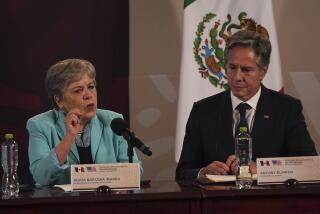Mexico Sting, Cuba Haunt Albright at OAS
- Share via
CARACAS, Venezuela — The knotty issues of Cuba and of Operation Casablanca, a huge U.S. money-laundering sting involving Mexico, dogged Secretary of State Madeleine Albright on Tuesday as she made a symbolic appearance at the annual meeting of foreign ministers of the Organization of American States.
Albright ignored both issues in her official speech to the ministers meeting as the General Assembly of the OAS.
But the corridors were crowded with delegates speculating about the possible return of Cuba to the organization sometime in the future--an issue that OAS Secretary-General Cesar Gaviria called “the most important unresolved political problem in the hemisphere.”
And Albright got a taste of the anger of the Mexicans over Operation Casablanca when she arrived here Monday night and met with Rosario Green, Mexico’s foreign secretary, in a private session. President Ernesto Zedillo was enraged by the presence of U.S. agents on Mexican soil during the money-laundering sting operation, which led to the arrests of several Mexican bank officials.
No U.S. secretary of State has attended a meeting of the OAS General Assembly since George P. Shultz showed up at the end of the Reagan administration in 1989. Albright told a news conference Tuesday that she had attended to demonstrate that “the United States is deeply committed to sustaining the progress that has been made toward peace, prosperity and democracy throughout this hemisphere.”
Although the issue of Cuba surfaced from time to time at these sessions, Albright insisted to reporters that “the issue of Cuba has not dominated the discussions, and I don’t believe that it will.”
She described the OAS as an organization of democratic states and noted: “Everybody would agree that Cuba does not meet those criteria.”
But Green told the OAS that Cuba “is not an issue that we can avoid.” She proposed creating a group, made up of representatives from a few governments, that would seek a solution to the problem of re-integrating Cuba into the organization.
That proposal lacks U.S. support and is unlikely to be accepted at the final session today. The OAS tries to avoid conflict and usually passes resolutions by acclamation.
Clinton administration officials were troubled by the prominence given Cuba by Gaviria on Monday in his opening remarks to the foreign ministers.
A senior State Department official disputed his characterization of Cuba as the most important issue in the hemisphere, referring instead to the U.S. view that the island nation is notable now only because it is the lone nondemocratic government in the Western Hemisphere.
“Clearly, Cuba does occupy a lot of public attention,” the official told reporters. “It is frankly more an anachronism than an active political problem today.”
In any case, the official said, “Castro has given no indication that he wants to join the OAS. It’s not as if he’s pounding on the door.”
Technically, Cuba is still an OAS member. But the others in the group voted in 1962 to exclude it from all meetings and activities because of its alleged attempt to subvert the governments of other states.
More to Read
Sign up for Essential California
The most important California stories and recommendations in your inbox every morning.
You may occasionally receive promotional content from the Los Angeles Times.













